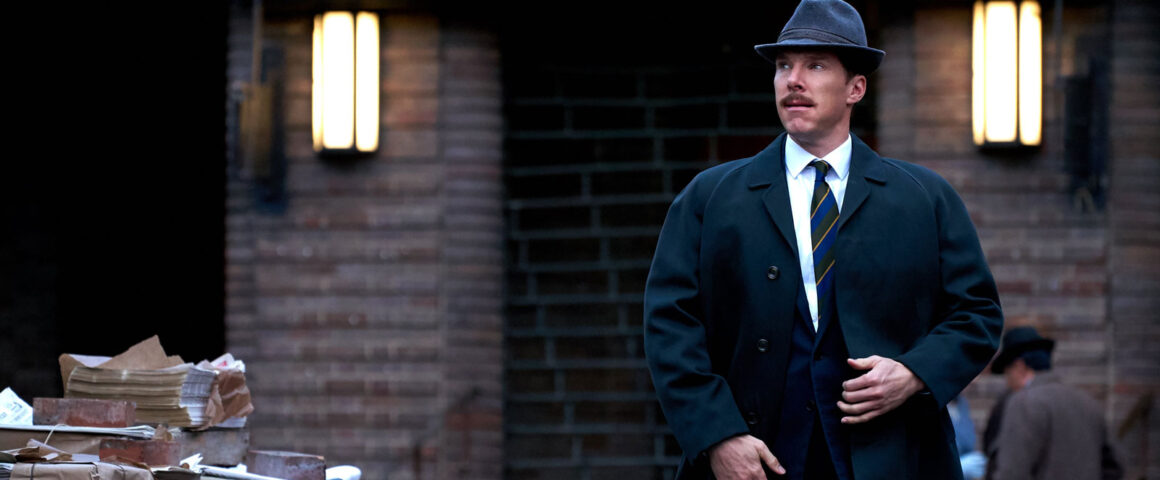The 1960s. A time of new fashions, innovative music and escalating tensions. In both glamorous opera houses and drab subways, business opportunities intermingled with the Cold War. As world leaders like John F. Kennedy and Nikita Krushchev made grand speeches that could promise destruction or peace, depending on the mood of the time, the covert activities of spies went on, activities that involved both government agents and civilians. If that seems surprising, remember that truth is sometimes stranger than fiction, and The Courier indeed sounds like a novel by John Le Carré or Len Deighton. Yet director Dominic Cooke and writer Tom O’Connor’s film is a based-on-actual-events tale of businessman Greville Wynne, recruited by MI6 and the CIA to smuggle secret Soviet information out of Moscow.
As with any based-on-a-true-story, the film is fictionalized for the purposes of narrative — any research into actual spy activities will reveal that espionage is a much messier process than any story. Not that fidelity to documented records stops a film being effective, as The Courier is a superbly crafted tale of geopolitical tensions, spy craft and suspense. The first act covers Greville’s (Benedict Cumberbatch, “Black Mass”) initiation into the “great game,” learning the trade from agents Dickie Franks (Angus Wright, “Official Secrets”) and Emily Donovan (Rachel Brosnahan, “Patriots Day”) while making contact with Oleg Penkovsky (Merab Ninidze, “My Happy Family”). From here, events become more tense as Oleg fears discovery and the world moves towards the Cuban Missile Crisis. In the third act, the film takes a swerve into something more melancholy, and Cumberbatch also undergoes a shift. Throughout the film the actor is on reliable form as Greville, combining the well-mannered gentleman with a sense of arrogance and entitlement, much as he did in “Tinker Tailor Soldier Spy,” “The Imitation Game” and “Doctor Strange.” He’s arguably not pushing himself, but his transition from confident albeit amateur spy to desperate victim is palatable, and a physical transformation makes the film all the more moving.
Despite the focus on Greville, this is a film very much about relationships. The marriage of Greville and his wife Sheila (Jesse Buckley, “Chernobyl” TV series) is strained despite evident devotion, while their son Andrew (Keir Hills) offers a more innocent perspective on the wider events. The professional spies have their own professional relationships with Greville and with each other, and the not-always amicable association between the agencies serves as an effective backdrop. Differing goals of gathering usable intelligence, maintaining peace and keeping their assets safe mean that Dickie and especially Emily often appear at the intersection of these goals, with the camera holding on their faces as they attempt to argue for humanity in the face of political expediency.
The most significant relationship, however, is that between Greville and Oleg, or Alex as he asks to be called. “Alex” is compelled by conscience to share information with the West, a conscience expressed in a powerful opening shot as the camera pans from the almost parodic monstrous figure of Krushchev (Vladimir Chuprikov, “Diplomatic Situation” TV series) to Oleg’s grim expression. Ninidze’s performance is an impressive piece of understatement, his eyes expressing volumes while his mouth remains firm, giving the British a run for their money in the stiff upper lip stakes. Between this man of conscience and compassion and Greville the rather bumbling but good-natured soul, a touching relationship grows that allows the film to explore the interplay of the interpersonal and the geopolitical. These two men, and their families, are impacted by the decisions of their government but also have impact themselves. The Cuban Missile Crisis underlines the role that these men play, unsung heroes operating in the shadows at significant personal risk. As the viewer sees this genuine friendship develop, we care for them and share their wish for peace, while also fearing for them as danger and violence stalk ever closer.
The film’s interweaving of the public and personal creates a strong resonance between this story and our contemporary times. The period detail is exquisite, from the costumes to the sets and the props, especially the various briefcases. Despite this, the film never feels quaint or old-fashioned. It is often tempting to look at films set during the Cold War such as “Bridge of Spies” and “Red Joan” as being nostalgic or at least dealing with something that is over and done with. However, any glance at major news stories of recent years will highlight that while the tensions between nations change, they do not end. Political aggression and severe intolerance continue to plague the world over, and it can feel like we have no influence over these threats. A story like The Courier serves to dramatize unknown people and exploits, and in doing so reminds the viewer that conscience and individual action can have an impact on wider events. While we are never as separate as we might like to imagine, a film like this reminds us to hold onto our interpersonal relationships, which might just end up making a wider difference.



